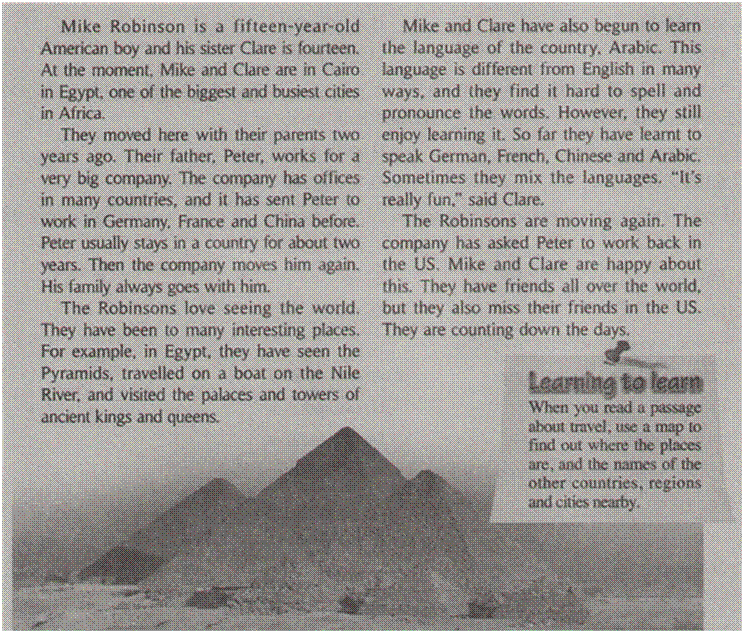英语学科知识与教学能力初级中学试卷(一)
考试总分:150分
考试类型:模拟试题
作答时间:120分钟
已答人数:365
试卷答案:有
试卷介绍: 英语学科知识与教学能力初级中学试卷(一)已经整理好,需要备考的朋友们赶紧来刷题吧!
试卷预览
-
1. Body language is a powerful communication system,__________it can signal very different things.
Abut
Bso
Cfor
Dthen
-
2. If you are curious about the history of our school or concerned about the future,you_______miss the excellent opportunity.
A may
Bneedn't
C could
Dmustn't
-
3. When the teacher came in, the children pretended _________ attentively.
Areading
Bto be read
Cbeing read
Dto be reading
-
4. What syllabus does the following present?
Unit 1 Self-introduction
Unit 2 Greetings
Unit 3 Asking the way
Unit 4 Making apologies
Unit 5 Inviting
Unit 6 Extending thanksAStructural syllabus.
BTopic syllabus.
CFunctional syllabus.
DOutline.
-
5. When you pick up a newspaper, you read through the headlines, titles and subtitlesquickly to get a general idea about what is written on the page and find out ifthere is anything interesting there. This skill is called_______.
A scanning
Bskimming
C inferring
Dpredicting
-
6. The_________of the learner's interlanguage is believed to be a major source of incorrect forms resistant to further instruction.
Aacculturation
Bfossilization
Cmotivation
Dcol.Iection
-
7. What can cloze help to train in terms of writing?
A Unityof texts.
BLayout of texts.
C Compilationof texts.
D Useof cohesive devices.
-
8. The teacher works as a(n)_______in the conversation below.Student:1go to the museum last Sunday.
Teacher:That's nice. You went to the museum last Sunday, right?A instructor
Bcontroller
C organizer
Dassessor
-
9. In which stage of the Presentation--Practice--Production approach will students have the chance to use the new language freely and incorporate it into their existing language?
APresentation stage.
BPractice stage.
CProduction stage.
DBoth the presentation stage and production stage.
-
10. Which of the following belongs to a post-reading activity in English teaching?
AScanning.
BPrediction making.
CRetelling.
DInductive reasoning.
-
11. Which of the following teachers' questioning strategies is NOT advocated inclass?
AAsking questions which are suitable for students' language level.
BAsking questions in a staged sequence.
CWait-time is allowed after a question.
DAsking another student immediately to answer the question when one cannot.
-
12. The new discovery was a great_______.
A suspicion
Bsensation
Cdeflection
Dsaturation
-
13. The word “edit” is formed by deleting an imagined affix from the word “editor” .Thisprocess of word-formation is called_______.
A clipping
Bblending
C derivation
Dback-formation
-
14. Which rhetoric is used in the following sentence?
A government of the people, by the people, and for the people.ASimile
BTransferred epithet
CMetonymy
DRepetition
-
15. When students are asked to find out the changes of their hometown and make a plan for an exhibition, which type of the following grouping methods is mostly recommended?
AWhole class work.
BGroup work.
CPair work.
DIndividual work.
-
16. I have kept the portrait__________I can see it every day as it always reminds me of my university days.
Awhich
Bwhere
Cwhether
Dwhen
-
17. The girl has awakened the feelings in him thathis thought had been_______long ago.
A called up
B taken up
C stamped out
D handed in
-
18. The core of systematic textbook evaluation is to examine how well a given textbook matches the needs of_________and how effectively and efficiently it can realize the objectives of the program.
Aa language program
Ba reader
Cteachers
Dschools
-
19. According to the manner of the articulation,/l/is considered to be the only __________in English.
Astop
Bfricative
Capproximant
Dlateral
-
20. Which of the following shows the proper pronunciation of the word "should" in the sentence"What should we do"?
-
21. As[k]in the word“came”and[g]in the word“game”are said to form a distinctive opposition in English,they are_______.
Asounds
Bphonemes
Callophones
Dvarieties
-
22. My niece has been to Sumatra and Iran as well as all of Europe.By the time she is twenty,she ________almost everywhere.
Awill be
Bwould have been
Cwill have been
Dwould be
-
23. The cognitive Approach holds that students’ mistakes are_________ in the creative use of language.
Auseful
Bunderstandable
Cunavoidable
Dreasonable
-
24. Which of the following is a Suprasegmental feature?
ADeletion.
BVoiced.
CStress.
D Stop.
-
25. The word" motel" is formed via word formation rule of_________.
Aclipping
Bblending
Cacronym
Dcombining
-
26. Many people believe that overwork_________Pan Jie's sudden death, who was a young female white-collar worker.
Acontributed to
Bresulted from
Cled in
Dbrought out
-
27. What is the teacher doing in terms of errorcorrection? S: I go to the theater last night.
T: You GO to the theater last night?A Correcting the student's mistake.
B Hinting that there is a mistake.
C Encouraging peer correction.
D Asking the student whether he really went to thetheater.
-
28. Which of the following activities focuses on meaning?
ASubstitution drill.
BSentence transformation.
CDictation.
D Group discussion.
-
29. In a pre-listening activity, students need to learn to cope with some ambiguity in listening and realize that they can still learn even when they do not understand every single word. The aim of this activity is to develop the skill of_________.
A listening for specific information
Blistening for gist
Clistening for structure
Dlistening for vocabulary
-
30. What is the teacher doing by saying" Now you are going to do this in pairs" ?
A Setting up tasks.
BControlling discipline.
CDemonstrating.
DGetting feedback.
-
1. 什么是教学反思?教学反思的注意事项有哪些?请具体说明教学后反思阶段的内容。
-
1. 在一次示范课活动中,王老师在讲授九年级(初中三年级)英语下册“Unit 6 Where would you like to visit?Section A 3a-4(鲁教版)”时,设计了下列活动:
(1)通过旅游城市图片创设情境让学生理解生词fantastic sights,通过语言情境让学生理解生词convenient,为阅读扫除障碍(留一部分生词学生阅读时去猜测)。
(2)用课件呈现埃菲尔铁塔和巴黎圣母院图片,提出问题What are they?Where are they?让学生思考、分享、回答并引出话题。
问题:(1)以上教学活动属于什么环节的教学?
(2)该教师运用了什么教学手段?分析其特点。
(3)分析以上教学活动的特点和影响。
-
1. 设计任务:
请阅读下面的学生信息和语言素材,设计l5分钟的阅读教学方案。教案没有固定格式,但须包含下列要点:
·teaching objectives
·teaching contents
·key and difficult points
·major steps and time allocation
·activities and justifications
教学时间:15分钟
学生概况:某城镇普通中学八年级(初中二年级)学生,班级人数40人。多数学生已经达到《义务教育英语课程标准(2011年版)》三级水平。学生课堂参与积极性一般。
语言素材: